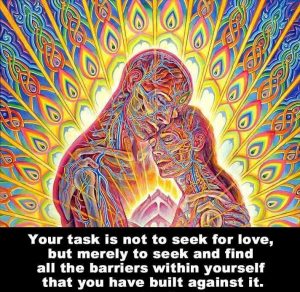
All throughout our early lives we were taught how to read, how to write, how to manipulate, calculate, mould, alter, build, destroy, theorize, study and analyse life. We were taught how to say “please” and “thank you”, as well as what was acceptable and unacceptable to others and society at large … but most of us failed to be educated in one essential dimension of life: self-love.
Something that continues to shock me about my own upbringing was the distinct lack of emphasis on respect for oneself and acceptance of one’s flaws and virtues alike.
As a child I can’t ever recall being taught the value of loving oneself; of setting healthy boundaries, knowing how to say “no” and “yes” when you mean it, and learning how to take care of yourself, even at the expense of others.
If you were raised in a culture and society similar to my own, you were probably taught to “put others before yourself” and not give much consideration to your own needs.
Self-denial and self-sacrifice were two of the main values taught in our childhoods, and continue to be emphasized as the markers of a “kind, caring and worthy human being” to this very day.
Unfortunately, from what I later learnt in life, these two values taught me nothing more than the profound emotional and psychological pain of being a self-imposed martyr with no real understanding of ‘love’.
 LEARNING HOW TO LOVE
LEARNING HOW TO LOVE
So what was the result of not being taught the value of self-love in childhood, and adopting the socially acceptable guise of a martyr later in life?
Depression, bitterness, anxiety, resentment and grudge-holding … these were the result.
I felt trapped, I felt utterly deprived, I felt used, abused and constantly taken advantage of.
The truth of life, I later learnt, was that without first learning how to love yourself you will nevertruly know how to love others. This applies to each and every being on the planet regardless of race, gender, religion or culture.
To use an analogy, how can an empty cup be used to quench the thirst of another? It is impossible. Likewise, it is impossible for us to give love if we haven’t first filled ourselves. Simple.
BECOMING A DOCTOR OF THE SOUL
Coming to terms with the fact that everything you were taught about what defines a “good and respectable person” is actually false can be hard to accept at first. But as thinker Jiddu Krishnamurti noted:
It is no measure of health to be well adjusted to a profoundly sick society.
The good news, I discovered, is that with time and persistence, we can learn how to heal ourselves. In essence, we can teach ourselves to become doctors of the soul, healing our wounds, curing our own sicknesses, and maintaining optimum health through the development of self-love.
If you have just started the path of healing and recovery, or need some inspiration, you might benefit out of the following things I have learnt and put into practice on my own journey, (in no particular order!)
 1. CHANGE YOUR DIET
1. CHANGE YOUR DIET
Swap processed, fatty and sugary foods, with whole, unprocessed and low fat foods. So much research has shown the link between food and the mind. Eating the wrong food is a sign of self-neglect and contributes to physical, emotional and even mental illnesses. Try slowly cutting out junk food, and experience the immense benefits!
2. IDENTIFY YOUR SUBPERSONALITIES
Within all of us there are subtle and incessant voices that sabotage and paralyze us, and these are the voices of our subpersonalities. I wrote about these a while ago. Awareness is the key to overcoming the negative self-talk of The Worrier, The Critic, The Victim and The Perfectionist.
 3. START READING
3. START READING
No, I don’t mean the news, or the latest ‘goss’ on Facebook, I mean reading books (funny obsolete things!) Focus on mostly non-fiction books in the self-help category. Reading this type of material helps expand your mind and equips you with inspiring and life-applicable knowledge. My current favourites are “Nonviolent Communication” by Marshall Rosenberg and “Emotional Intelligence” by Daniel Goleman.
 4. EXPLORE YOUR ‘COGNITIVE DISTORTIONS’
4. EXPLORE YOUR ‘COGNITIVE DISTORTIONS’
Cognitive distortions are responsible for a lot the anxiety and depression we experience in life. Some of these include black and white thinking, catastrophizing, and future telling.
5. PRACTICE SELF-HYPNOSIS
I personally found self-hypnosis an extremely powerful tool in re-wiring my brain from destructive thought patterns. Read more about it.

6. GET 7-8 HOURS OF SLEEP EVERY NIGHT
Also … ensure you set a stable bedtime! Once upon a time my bedtime was 1am, and I rose at 6am (that’s a measly average of 5 hours sleep). Getting less than the recommended 7-8 hours of sleep every night, as I found, lowers your immunity, contributes to chronic fatigue, moodiness, depression, anxiety issues, and chronic pain (or fibromyalgia). Aim to go to bed around 10pm and rise at 6am. You will seriously feel the difference!
 7. LEARN QUIET ASSERTIVENESS
7. LEARN QUIET ASSERTIVENESS
It is not necessary to be an obnoxious jerk about what you do and don’t want out of others and life in general. But it is essential to know how to stand up for yourself and set healthy boundaries. Read more about how to be quietly assertive here.
8. EXPLORE YOUR MENTAL TRAPS
Low self-esteem is often a result of false and unrealistic thought patterns that are deeply ingrained within us. These are composed of mental traps such as assumptions, beliefs, comparisons, desires, expectations and ideals about ourselves and others.

9. TREAT YOURSELF LIKE YOU WOULD YOUR BEST FRIEND
Often, we are our own mortal enemies. To heal ourselves, it is important for us to consciously change our relationships with ourselves, and treat ourselves with compassion and consideration just as we would with a best friend.
10. WELCOME SOLITUDE INTO YOUR LIFE
When we don’t make space in our lives to be alone, it is easy for us to burn out, become disorientated and even ill. Each day, make time for yourself to rewind, relax and reflect, alone. Solitude gives you insight, perspective and reinstates harmony in your life.
11. MEDITATE FOR SELF-AWARENESS
Becoming self-aware is a key skill in life, a gift that allows you to identify your self-destructive patterns of thought and behaviour, and find more peace and balance in life. Meditation, although frustrating and seemingly meaningless at first, is a silently potent practice with endless benefits. Aim for 10-15 minutes each morning first thing (or whenever you have time!)
12. IDENTIFY POISONOUS PEOPLE IN YOUR LIFE
Poisonous people make us feel wretched and significantly lower the quality of our daily lives. Poisonous people are often judgemental, manipulative, clingy, backstabbing, ruthless, aggressive, controlling, liars, self-pitying and self-destructive. Learning to cut away those who hinder your self-growth is a difficult, but absolutely necessary step on your journey of healing.
13. SEEK SUPPORTIVE COMPANIONS
Supportive people encourage us, uplift us, and inspire us. These people have often obtained a certain level of self-love, and because of their ability to respect themselves, they are easily able to respect and love others. Often it is not necessary to seek these people out as we naturally gravitate towards them on our paths! However, it always helps to instigate friendships and connections with the supportive people of life as they can really help us out in dreary periods of our journeys.
14. LEARN TO TRUST YOUR INTUITION, OR INSTINCT
Our unconscious minds are oceans of wisdom, understanding and insight. Intuition, that mysterious inner guide we all have, is a manifestation of this vast untapped world within us. Learning to trust your intuition will help you to live a life true to yourself and your deepest needs.
15. SUPPORT THE WELL-BEING OF NATURE
All of life on earth and the universe is so interconnected, that the harm we do to others always comes back to harm us in one form or another. By supporting the well-being of nature – whether by becoming a vegan or vegetarian, by choosing sustainable food and products, or even by replacing our cosmetics with organic “non animal tested” alternatives – we are promoting the well-being of the earth and thus the well-being of us as individuals. By healing ourselves we heal others, and by healing others we heal ourselves.

16. TAKE A WALK OR JOG EACH DAY
This is not always possible, but regular exercise really does benefit your body, mind and soul, proving that you are actively taking care of yourself.
17. STOP SPENDING SO MUCH TIME ON SOCIAL NETWORKS
Did you know that on average the American adult spends 3.2 hours per day on social networks? Whether it’s Facebook, Twitter, Snapchat, Instagram, Tumblr, Pinterest, or any of the numerous other social networks out there, we waste so much of our time on social media … and what for? Often times we are motivated by the ability to obtain “likes”, “shares”, “followers” and “friends”, constructing a feeble cyber alter-ego that craves for acceptance and the esteem of others. For this reason, social media is a sickly environment to constantly expose ourselves to each day, and many studies have shown its detrimental effects on our health, including an increase of depression and low self-esteem. Connect with your friends and family – sure! – but stop using social networks to unconsciously build a false and unstable sense of self-worth.
18. REASSESS YOUR WARDROBE
Colors are said to greatly impact our psychology (hence “color psychology”). I have recently replaced a lot of my black, grey and dull colored clothing for bright shades of various colors. The experience has been surprising: the colors of the clothes I wear actually impact my mood noticeably. Wearing light blue for instance, stimulates feelings of openness, or yellow: optimism. Dull colors like khaki, granite and charcoal on the other hand, are all associated with feelings of apathy, aloofness, pessimism, and despondence.
19. MAKE TIME TO EXPLORE YOUR PASSION
What drives you? Fires you up? Fills you with joy and a sense of accomplishment? When we learn to forget our needs and smother them with others, we often lose sight of what truly makes us happy in life. Many of us abandon our dreams at an early age, and so live meaningless lives of drudgery and socially approved pursuits (such as having a “good” career, big house, nice car, perfect family, etc.) It is important, therefore, to ask yourself “What is my passion?” Remember, passions are not static and they can evolve with us. Whether painting, writing, dancing, designing, building, or whatever excites you – pursue it – even if on the sidelines!
20. FOCUS ON REDUCING SOURCES OF STRESS IN YOUR LIFE
Prolonged stress contributes to so many illnesses in our lives, so it is important to learn how to reduce, and deal with it when it comes. Often stress can be reduced by dropping our desires and expectations for ourselves, other people and situations in life. Stress can also be reduced by practising many of the things I have mentioned in this article, e.g. having a good diet, 7-8 hours sleep per night, self-hypnosis, targeting negative thought-patterns, and so forth.
21. ACCEPT YOUR FLAWS. CELEBRATE YOUR STRENGTHS
It is important to come to terms with the fact that you are imperfect – there is NO denying it. As part of my journey, I have dedicated a lot of time to exploring my Shadow Self, and accepting the embarrassing and even shameful aspects of my nature. By accepting your flaws, the doorway to self-improvement is opened. Accept them, don’t run away from them. Likewise, learn how to celebrate your strengths! Keep a journal of affirmations and honestly list each day every little thing you appreciate about yourself. Balance is essential.

Disclaimer: We at Prepare for Change (PFC) bring you information that is not offered by the mainstream news, and therefore may seem controversial. The opinions, views, statements, and/or information we present are not necessarily promoted, endorsed, espoused, or agreed to by Prepare for Change, its leadership Council, members, those who work with PFC, or those who read its content. However, they are hopefully provocative. Please use discernment! Use logical thinking, your own intuition and your own connection with Source, Spirit and Natural Laws to help you determine what is true and what is not. By sharing information and seeding dialogue, it is our goal to raise consciousness and awareness of higher truths to free us from enslavement of the matrix in this material realm.
 EN
EN FR
FR



























thank you Cristina for your wisdom, you are wonderful
Thank you dear Paul, for your kindness.
Victory of the Light!!
thank you Cristina for your wisdom ,you are wonderful
Really liked this. Thanks